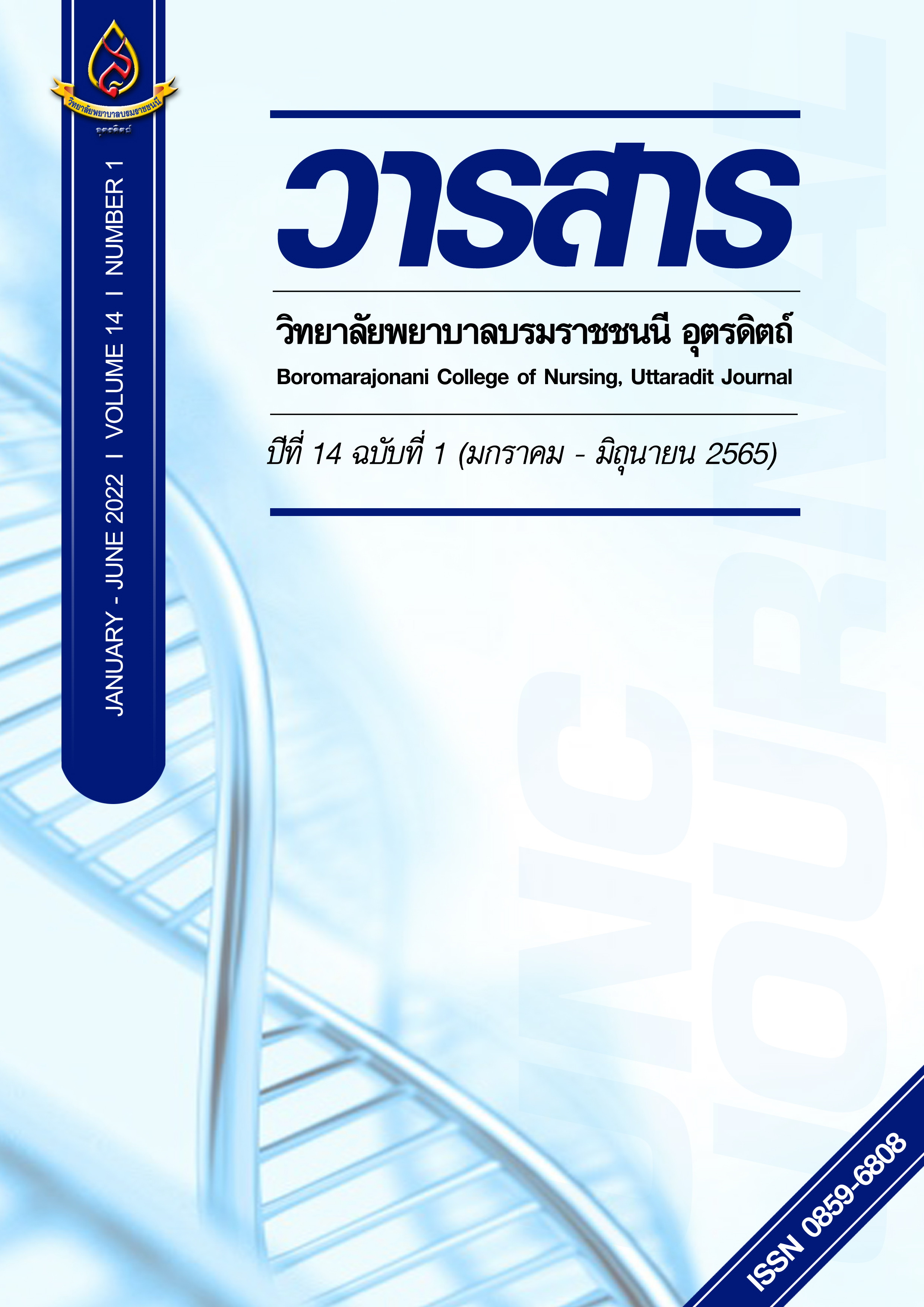การประยุกต์ใช้การส่งเสริมการทบทวนชีวิตในการปฏิบัติการพยาบาล: กรณีศึกษาผู้ป่วยโรคมะเร็งที่ได้รับการดูแลแบบประคับประคอง
Main Article Content
บทคัดย่อ
การส่งเสริมการทบทวนชีวิตเป็นกระบวนการที่ส่งเสริมให้บุคคลระลึกถึงเรื่องราวประสบการณ์ชีวิตในทางบวกของตนเอง นำข้อขัดแย้งในจิตใจที่เกิดขึ้นในอดีตที่ยังไม่ได้รับการแก้ไขกลับมาพิจารณาอีกครั้ง รวมถึงการสะท้อนคิดจากเรื่องราวชีวิตที่ผ่านมา ช่วยให้บุคคลได้รักษาเยียวยาความขัดแย้งบางอย่างในจิตใจที่เกิดขึ้นในอดีต เกิดการปรับเปลี่ยนทัศนคติเกี่ยวกับตนเองใหม่ในทางที่ดีขึ้น ยอมรับและพึงพอใจในตนเอง ทำให้มีความรู้สึกมีคุณค่าในตนเองเพิ่มขึ้น มีความผาสุกทางจิตวิญญาณและมีคุณภาพชีวิตเพิ่มขึ้น การส่งเสริมการทบทวนชีวิตสามารถนำมาประยุกต์ใช้ในการดูแลผู้สูงอายุ ผู้ป่วยโรคมะเร็ง รวมถึงผู้ป่วยที่ได้รับการดูแลแบบประคับประคอง กระบวนการส่งเสริมการทบทวนชีวิตประกอบด้วย 3 ขั้นตอน คือ 1) การสร้างสัมพันธภาพกับผู้ป่วยและการทบทวนชีวิตเกี่ยวกับเรื่องราวในปัจจุบัน 2) การทบทวนชีวิตเกี่ยวกับเรื่องราวในอดีต และ 3) สรุปการทบทวนชีวิต การส่งเสริมการทบทวนชีวิตเป็นกิจกรรมการพยาบาลที่เป็นบทบาทอิสระของพยาบาล ทั้งนี้พยาบาลที่จะนำไปใช้ควรได้รับการฝึกอบรมจากผู้ที่มีความเชี่ยวชาญเกี่ยวกับการส่งเสริมการทบทวนชีวิต โดยบทความนี้นำเสนอกรณีตัวอย่างของการประยุกต์ใช้การส่งเสริมการทบทวนชีวิตในการปฏิบัติการพยาบาลการดูแลผู้ป่วยโรคมะเร็งที่ได้รับการดูแลแบบประคับประคอง และพบว่ากรณีศึกษามีความรู้สึกมีคุณค่าในตนเองเพิ่มขึ้นภายหลังได้รับการส่งเสริมการทบทวนชีวิต
Article Details

อนุญาตภายใต้เงื่อนไข Creative Commons Attribution-NonCommercial-NoDerivatives 4.0 International License.
บทความหรือข้อคิดเห็นใดใดที่ปรากฏในวารสารวิจัยการพยาบาลและวิทยาศาสตร์สุขภาพ เป็นวรรณกรรมของผู้เขียน ซึ่งบรรณาธิการหรือสมาคมศิษย์เก่า ไม่จำเป็นต้องเห็นด้วย และบทความที่ได้รับการตีพิมพ์เผยแพร่ถือเป็นลิขสิทธิ์ของวารสารวิจัยการพยาบาลและวิทยาศาสตร์สุขภาพ
เอกสารอ้างอิง
Butler, R. N. (1963). The life review: An interpretation of reminiscence in the aged. Psychiatry, 26(1), 65-76.
Butler, R. N. (1973). Aging and mental health. MD: C.V. mosby.
Canadian Cancer Society. (2017). Self-esteem and body image. Retrieved from http://www.cancer.ca/en/cancer-information/cancer-journey/living-with-cancer/dealing-with-change/self-esteem-body-image/?region=on.
Chaisa, P., Ponpiboon, P., & Sittisombut, S. (2019). Effect of promoting life review on spiritual well-being among advanced cancer patients. Nursing Journal, 46(3), 49-57 (in Thai).
Chen, Y., Xiao, H., Yang, Y., & Lan, X. (2016). The effects of life review on psycho-spiritual well-being among patients with life-threatening illness: A systematic review and meta-analysis. The Journal of Advanced Nursing, 73(7), 1539-1554.
Erikson, E. (1982). The life cycle completed. NY: W.W. Norton.
Gilani, S. R. M. & Pour, A. D. (2016). The effects of physical activity on self-esteem: A comparative study. International Journal of High Risk Behaviors and Addiction, 6(1), e35955.
Haight, B. K. (1988). The therapeutic role of a structured life review; process in homebound elderly subjects. Journals of Gerontology, 43(2), 40-44.
Jenko, M., Gonzalez, L. & Seymour, M. J. (2007). Life review with the terminally ill. Journal of Hospice and Palliative Nursing, 9(3), 159-163.
Lortamma, P., Kooariyakul, A., Yottavee, W., Kaewkhong, N., & Chidnayee, S. (2019). Lived experience of women with breast cancer after receiving chemotherapy. Boromarajonani College of Nursing, Uttaradit Journal, 11(2), 32-48. (in Thai).
Mahasittiwat, Y. (1986). The relationship between perceived physical and psychosocial changes, Self-esteem and health behavior of the elderly in Mueang District Saraburi (master’s thesis). Mahidol University, Bangkok. (in Thai).
National Cancer Institute. (2015). Cancer staging. Retrieved from https://www.cancer.gov/ about-cancer/diagnosis-staging/staging.
National Cancer Institute. (2017a). Types of cancer treatment. Retrieved from https://www.cancer.gov/about-cancer/treatment/types.
National Cancer Institute. (2017b). Spirituality in cancer care. Retrieved from https://www.cancer.gov/about-cancer/coping/day-to-day/faith-and-spirituality/spirituality-hp-pdq.
Phengjard, J. (2014). Nurse’s role in palliative care. Journal of Boromarajonani College of Nursing, Bangkok, 30(1), 100-109. (in Thai)
Rosenberg, M. (1965). Society and the adolescent self-image. NJ: Princeton University Press.
Rosenberg, M. (1989). Self-esteem and adolescent problems: Modeling reciprocal effects. American Sociological Review, 54(6), 1004-1018.
Siriso, J., Tanasin, S., & Pattong, N. (2017). Selected factors related to the quality of death of persons with terminal cancer as perceived by family caregivers. Journal of Nursing Science Chulalongkorn University, 29(2), 112-123. (in Thai).
Taechapattanawong, S. (2010). The effects of group counseling base on Person-centered theory on Self-Esteem of Elderly (master’s thesis). Srinakharinwirot University, Bangkok. (in Thai).
World Health Organization. (2018). Palliative care. Retrieved from http://www.who.int/en/news-room/fact-sheets/detail/palliative-care
Xiao, H., Knong, E., Pang, S., & Mok, E. (2013). Effect of a life review program for Chinese patients with advanced cancer. Cancer Nursing, 36(4), 274-283.
Yottavee, W., Kaewkong, N., Lowthumma, P., Chidnayee, S., Chaiwongnakpun, C., & Tummee, S. (2019). Adaptation of woman with breast cancer. Boromarajonani College of Nursing, Uttaradit Journal. 11(2), 272-283. (in Thai).
Zhang, X., Huimin, X. & Chen, Y. (2017). Effects of life review on mental health and well-being among cancer patients: A systematic review. International Journal of Nursing studies, 74, 138-148.


